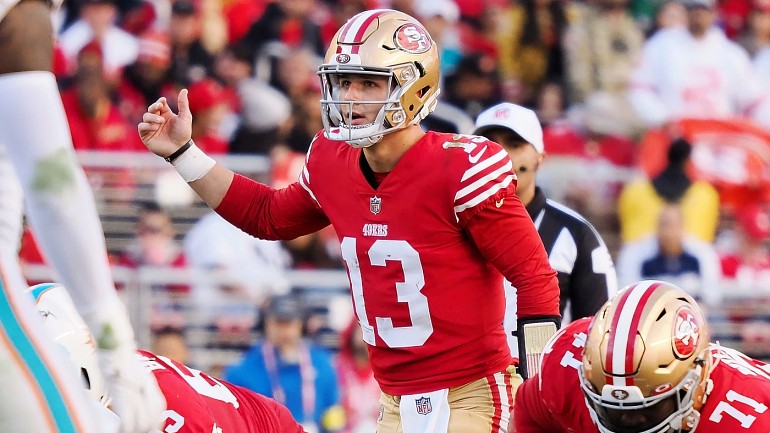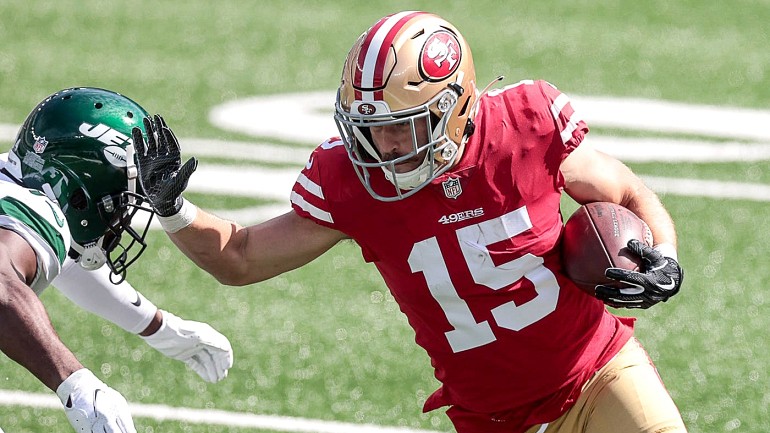
Sergio Estrada-USA TODAY Sports
Richard Sherman calls Kyle Shanahan ‘more of a straight shooter’ than Pete Carroll
Videos are auto-populated by an affiliate. This site has no control over the videos that appear above.
Ronnie Lott
recently compared Kyle Shanahan to legendary San Francisco 49ers head coach Bill Walsh. Another defensive back, Richard Sherman, never played for Walsh but has played for another successful NFL head coach in Seattle — Pete Carroll. He compared the two during a recent discussion with NFL.com about the
most valuable traits of an NFL head coach.
Sherman didn't just list similarities between Shanahan and his coach of seven years with the Seahawks. He also noted their differences. The two men are the only head coaches he's played for during his illustrious Hall-of-Fame-worthy career.
Sherman notes that Carroll isn't a "rah-rah, curse-you-out" coach. Nor are any of his assistants. Instead, the Seahawks coach relies on positive feedback and reinforcement to bring out the best in his players.
"Kyle is similar in that he has a philosophy of the best man plays," Sherman told Jim Trotter. "He doesn't care about your draft position or any of that."
Then you have the differences.
"[Shanahan is] more of a straight shooter than Pete," Sherman continues. "Pete has a way of making sure everybody feels good, making sure he pushes buttons with certain players and not pushing buttons on other players. Kyle is different. He's one size fits all.
I'm going to cut it to you as straight as I can, as best as I can, and I'm going to explain every single detail of what I understand about the game that either makes this a good play or a bad play or makes us a good team or a bad team. That honesty is something that I think is valuable in a head coach because there's no gray area."
Shanahan has no problem telling his players the truth, good or bad, while also being able to absorb genuine feedback from those players. Sherman respects that honesty and objectivity.
Shanahan's knowledge of the game is one of the additional aspects that drew Sherman to join the one-time division-rival 49ers in 2018.
"Kyle is one of the best offensive minds we've ever had in this game," Sherman said. "That comes into it. With Pete, it's the Cover 3 he brought to the league. It seems so simple, but nobody can run it like we ran it. The way both of them implement what they do -- they talk to others on a personal level, then have the great coaches around them who believe in their philosophy."
Sherman notes that last part as being an essential trait for a head coach because it's the staff that has to continue relaying the coach's philosophy on a daily basis.
"We might sit in a meeting with the head coach for 30 minutes a day," adds Sherman, "but I sit in meetings with the assistants for five to six hours a day. So the staff is critical."
Facebook Comments
More San Francisco 49ers News
Breaking down the 49ers drafts under John Lynch and Kyle Shanahan
We are less than one week away from the NFL Draft, and the San Francisco 49ers have their first day-one draft pick since 2021. That was the year they selected QB Trey Lance number three overall. The trade-up to get Lance cost the 49ers their first-round picks in 2022 and 2023. And now that they are back in the first round, at pick 31, fans are anxious to see what the team does with the pick. And with former assistant GM, Adam Peters, now in Washington, it will be interesting to see how well the 49ers draft without Peters in the room.
We looked back at the seven drafts GM John Lynch and Head Coach Kyle Shanahan have led to see what information we could pull from those drafts. There were plenty of hits, plenty of misses, and a few surprises along the way. The draft picks are
Brock Purdy hopes Kyle Shanahan makes addition to 49ers playbook
San Francisco 49ers quarterback Brock Purdy threw for a franchise-record 4,280 yards last season, leading the team to the Super Bowl and earning his first Pro Bowl selection. He held onto the football 39 times on the ground, rushing for 144 yards and scoring twice. This marked a significant improvement over his rookie 2022 campaign when he had 22 carries for 13 yards and a score.
Purdy further displayed his athleticism during the 49ers' playoff game against the Detroit Lions last season, helping engineer a comeback victory while rushing for 48 yards on five carries.
On Tuesday morning, Purdy joined the "Pat McAfee Show," acknowledging that he believes he can contribute more rushing yards if called upon. However, that decision rests with head coach Kyle Shanahan,
2024 NFL Draft: Dates, times, TV, streaming, 49ers picks, more
The San Francisco 49ers possess 10 selections in the 2024 NFL Draft, including the No. 31 overall pick. Notably, the team did not hold selections in the first two rounds last year. Below is essential information regarding the three-day rookie selection process, marking the 89th occurrence in league history.
As always, you can rely on 49ers Webzone for live news and breakdowns from the draft. You can also follow us on Twitter and Facebook.
49ers Draft Picks
Round 1, Pick 31 Overall
Round 2, Pick 63 Overall
Round 3, Pick 94 Overall
Round 4, Pick 124 Overall (via
49ers sign WR Trent Taylor, reuniting with former draft pick
The San Francisco 49ers announced the signing of wide receiver Trent Taylor to a one-year deal, reuniting with the team's former fifth-round draft pick out of Louisiana Tech.
Matt Maiocco of NBC Sports Bay Area was the first to report that the 49ers were discussing a potential reunion with Taylor. The receiver was part of head coach Kyle Shanahan and general manager John Lynch's first draft class in 2017 and spent his first four NFL seasons with the team.
The #49ers are talking with free-agent slot receiver/return man




